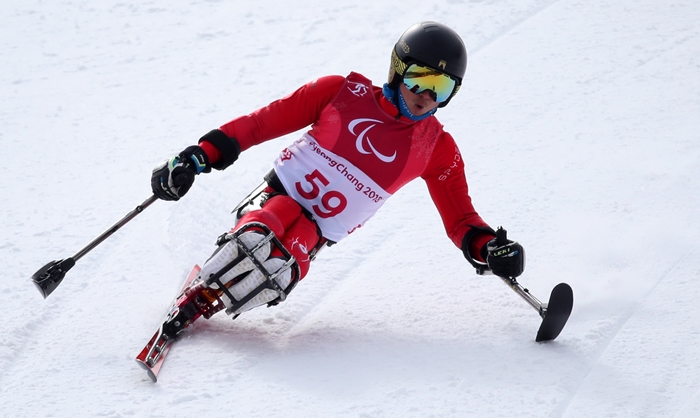| The Olympic and Paralympic games have similar categories, but feature sports that are different in many ways, including in terms of required gear and game rules. Korea.net is here to give you a Paralympic preview. We will compare six Paralympic events with their Olympic counterparts: para alpine skiing, para biathlon, para cross-country skiing, para snowboard and wheelchair curling. We’ll introduce them as a series to help readers fully enjoy the PyeongChang Paralympic Games. |

Alpine skier Han Sang-min tries out the slope during a practice run at the Jeongseon Alpine Center on March 7. (Yonhap News)
By Kang Gahui and Yoon Jihye
Para alpine skiing and Olympic alpine skiing are similar sports. Competitions for both the men and women are comprised of five disciplines: downhill, slalom, giant slalom, super giant slalom and super combined.
However, para alpine skiing has more specific classifications for fairness in terms of the kind of disability.
It’s divided into visually impaired(B1-B3), standing(LW1-LW9) and sitting(LW10-LW12) for blind athletes, athletes with impairments, and then paralyzed or impaired athletes.
Among the 80 gold medals at the Paralympic Games, 30 of them are allocated in alpine skiing.
In the visually impaired category, blind athletes ski down the slope while receiving guidance on the course, direction and geographical features from a guide runner in a fluorescent orange vest. They go ahead of the athlete and communicate through a wireless headset. For this reason, the audience at the venue should keep quiet during the event.
In the sitting category, athletes use a belt and a frame to sit on a chair and ski. They use outriggers, which are shorter than existing ski polls and have skates at the bottom, for balance.
The fastest athlete in every discipline wins. However, the athlete who crosses the finish line first doesn't always take first place. The winner is decided by multiplying the record at the finish line by their level of disability.
The most likely front runners in para alpine skiing this year are Andrea Rothfuss of Germany and Marie Bochet of Fance.
kgh89@korea.kr